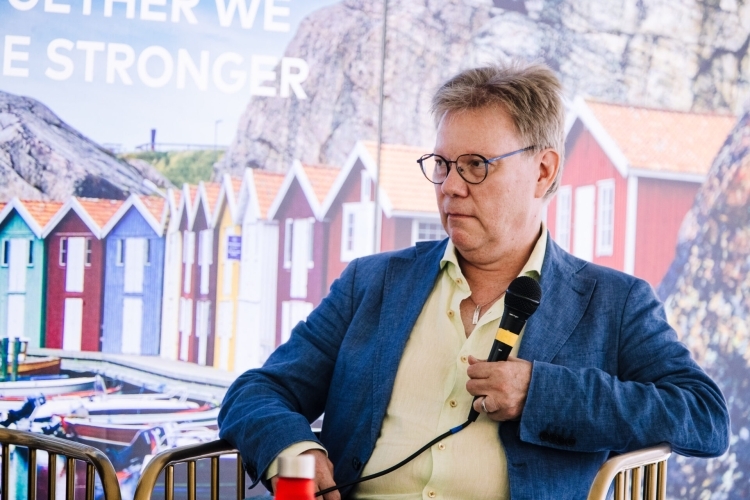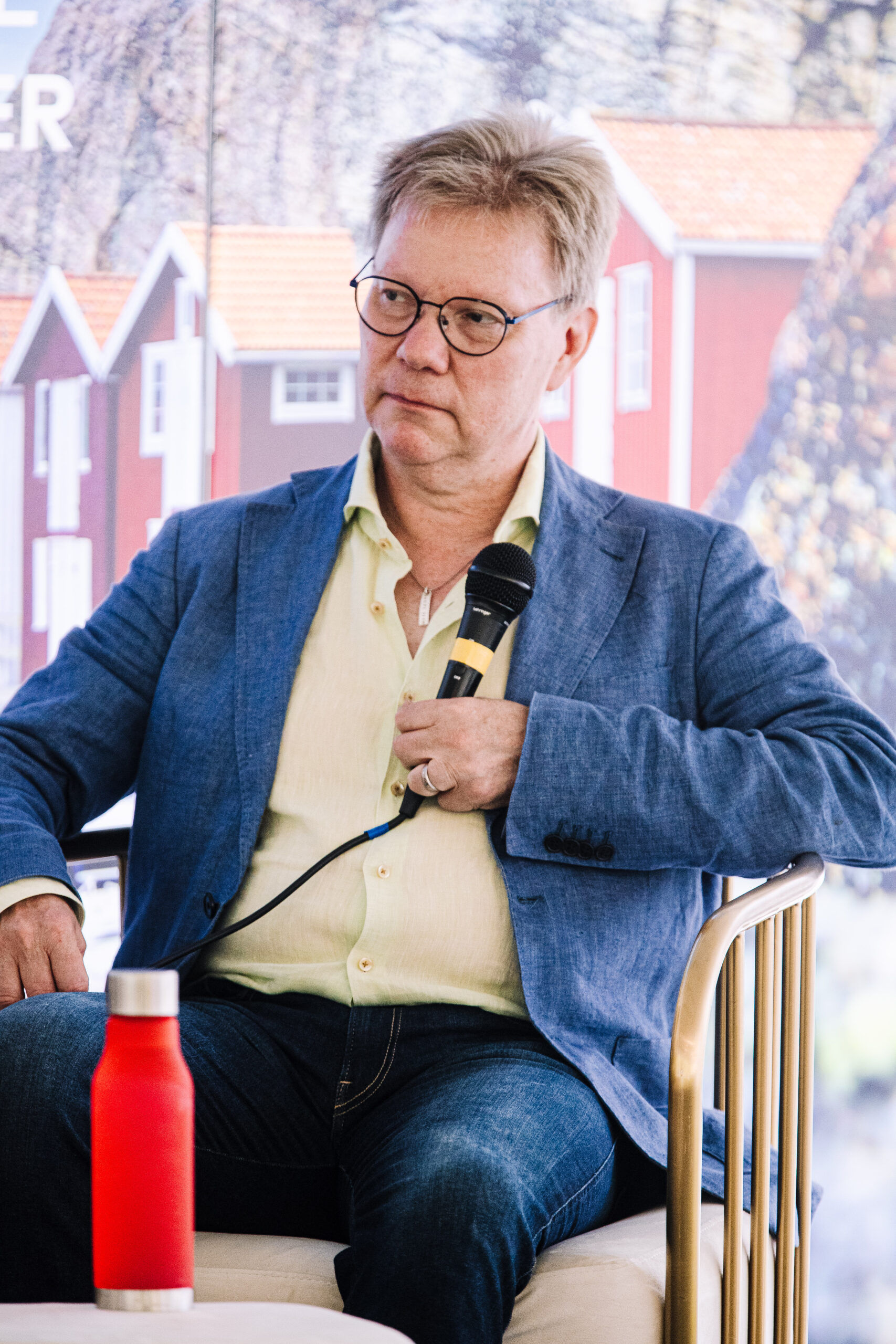Burnout is not burnout after all? Finnish mental health specialist calls out those romanticising burnout

The average person spends a third of their life at work. Working can make us happy as well as bring us down. But what happens when the negative outweighs the positive? Here to discuss the matter is Professor Jari Hakanen of the Finnish Institute of Occupational Health.
For more than 20 years, Professor Jari Hakanen has studied Finnish working life from the perspective of well-being at work. He is a Research Professor in the field of modern work and leadership at the Finnish Institute of Occupational Health. Hakanen’s areas of practice include work and development of work organisation, and he specialises in positive psychology, work and family, well-being at work, work adjustment and workplace burnout.
Burnout has been a hot topic in recent years in relation to working life. How big of a problem is it, and who does it really concern? Does this relate to the employee or the employer, i.e. who should have to deal with burnouts?
We have devised a kind of traffic light model in Finland, where green indicates no burnout, yellow indicates an increased risk of burnout, and red indicates burnout.
Burnout refers to extreme anguish and exhaustion. In Finland, for example, around 25 per cent are either at increased risk of burnout or have already experienced burnout. This means one in four people.
I don’t expect it to be much different in other countries. Some places may have it worse, others a little better, but it seems that burnout is all too common in our working lives.
The Finnish Occupational Health Care Act says that if an employee informs their employer about burnout or other work-related health hazards, the employer is required to address the matter.
It is important to acknowledge that people can also burn out whilst doing hybrid and teleworking. When you work from home, your supervisor can’t see if something is really not right. Naturally, you need to signal as soon as possible that something is wrong. You should step up and speak up if you feel that the workload is too much given the resources provided.
Keep in mind that this doesn’t detract from the employer’s duty to make sure that their employees have decent working conditions. It also means that there is no expectation to be working all the time. Employers must provide positive resources such as autonomy, support and recognition – these are the counter-balancing factors when it comes to workload. Positive experiences help to live up to high working standards.
How to recognise the tell-tale signs of burnout? For example, if I feel like something is off, how can I be sure it’s burnoutand not something else, like boredom? What is the difference between the two?
You might not be able to tell the difference. We put together a very good online test in Finnish, where you answer questions to find out if you are at risk of burnout or boredom at work. You can take the test to learn if you’re bored and how bored, how burnt out you are, how happy you are or whether you’re a workaholic.
It outlines various positive and negative states, which are then compared with the respondent’s reference group in the Finnish population. The test considers gender, age and other relevant factors.
If you are unable to take this online test, the easiest way is to reflect on how well or badly you are doing and how you feel while at work. If there is a good balance between your work and the remuneration or recognition you receive for it, that’s a good thing. But it’s a problem when you feel like you’re clearly working much more than what you’re getting paid for.
These days, we define burnout through a few key symptoms that should be monitored. Firstly, a constant feeling of exhaustion, a chronic fatigue that doesn’t go away even after a long summer holiday.
Secondly, the onset of cynicism or mental distancing. This is a kind of negative coping mechanism, where you used to like the work and the clients, but now you keep your distance and are more cynical. Work no longer matters to you.
And thirdly, emotional control. People who are overworked and under a lot of stress can sometimes develop negative emotional reactions that come as a surprise to themselves. Someone bursts into tears in the middle of a meeting or becomes enraged. This happens because emotions are harder to control.
Burnout doesn’t just appear out of nowhere. It can be a process that is years in the making and can lead to stress, sleep disorders, headaches, stomach aches and a number of other ailments.
Boredom at work is another matter completely. It has also been studied much less. I started working on boredom at work 13 years ago and contrary to burnout, boredom can come from the feeling that there is too little of everything… Employees feel like there aren’t enough exciting challenges in their work and so they get bored. They think: I could do this much better, but there is too little meaningful work for me.
You might think that boredom is linked to a very monotonous job, but in reality, there are not many jobs like this around anymore. It is more likely for white-collar employees to feel bored because they are unable to do what they really want to do. For example, in a large corporation with a lot of bureaucracy, restrictions prevent you from giving your best work performance.
It’s not that work is boring per se, it’s that there are things that make working more cumbersome. Sometimes, it can be hard to spot the difference between burnout and boredom.

Jari Hakanen believes that people who think of burnout as somehow heroic have never actually experienced this debilitating disease. Photo: Ken Mürk
Speaking of burnout, do people treat it as a serious condition, or do they see it more as a kind of trend?
Yes, it is indeed interesting that we occasionally hear people bragging about how they were burnt out, and it is seen as something positive. The hero burnt out, but then arose from the ashes! I don’t believe that these people have suffered from real burnout. Those who are actually burnt out behave very differently.
It is frequently expressed with a great deal of shame: I failed at my work; I didn’t achieve my goals and I lack energy; maybe my colleagues are doing just fine, but it was me who burnt out and had to abandon them. They are hit by a very strong sense of failure.
The cause of the burnout will perhaps be discovered later. It’s not about weakness or laziness – in fact, it’s the opposite. The problem could be that they were asked to do too much but lacked the support of their superiors, or it might have involved bullying or unfair treatment.
Thanks to studies, we know what other signs are associated with burnout, but people who have burned out usually feel a strong sense of shame. It’s not something they are proud of. So seeing burnout as something heroic is just not realistic – it doesn’t come from experiencing real burnout. The person telling such a story may have been stressed at one point.
Burnout is a difficult ordeal because it has a devastating effect on your health, quality of life, family and friendships – you just don’t have the energy to deal with it all.
Finland has a system detailing what steps to take if an employer discovers that one of their employees is having problems. What exactly is that all about?
The occupational health system in Finland is very well established. We have a fair number of occupational health psychologists, not just doctors or nurses.
One thing that I really like in practice is that when someone is burnt out or bored, occupational health negotiations or discussions are held between the employee, the employer (usually the person’s supervisor) and someone from the occupational health service who brings a different perspective.
They talk about what is amiss in the working conditions and what it would take to make the person feel better. They determine whether it’s an illness. They also consider whether anything will have changed at work when they return to their position, or whether nothing will change, meaning that burnout symptoms may reappear shortly.
I haven’t seen any statistics on how well it actually works in practice, but I think this is again something that depends on the workplace, whether they are smart enough to use occupational health services. But I do think this is a good approach.
To my knowledge, the Prime Minister’s Office in Finland has launched a project asking other countries about their practices in identifying burnout and the steps to follow. What progress has been made with the project and what have you managed to find out so far?
Ah, I see you are well informed. (Laughs) In fact, I am involved in this project. We cannot say much about the results yet, but we are conducting interviews in quite a few European countries and trying to find the right people to collect information from.
The overarching idea of the project is to understand how burnout is identified or defined in different countries. What status does this disease hold? In some countries, such as Latvia and Italy, burnout is registered as an occupational disease, so it has an official designation. But we want to know what this means in practice.
There are also countries where burnout isn’t even talked about, and we’re trying to understand how burnout is defined there and what happens when you burn out.
We look into their rehabilitation methods and preventive measures in the workplace. We ask what other countries are doing and what we could learn from them. Because our job is to advise the Finnish government on policy for treatment and prevention. How to address this highly persistent problem in Finland and learn something new and improve practices so that fewer people burn out. The ultimate goal is zero burnout.
What do you think, will we ever be able to consider burnout a disease of the past?
I would like to see this in modern working life, of course, but I doubt it will be easy in practice. In fact, it will probably be impossible. Since working life is constantly undergoing major changes, there is a lot of uncertainty.
I’m afraid that burnout is firmly embedded into modern working life. We can most certainly improve our prevention methods and early detection of burnout. We can work in a way that doesn’t lead to serious chronic illness with terrible consequences such as depression, anxiety and incapacity for work.
We must think about what we should be doing much better to look after the well-being and health of our workforce, so that as few people as possible burn out. That is my professional mission.
You have done extensive research on issues related to working life. Lately, there is a growing shift towards sustainable working when approaching working life. What does that mean?
Broadly speaking, work is sustainable when social, environmental and economic conditions are met.
Sustainable working involves doing three valuable things at once. This means the work is engaging and productive, meaning that people can manage their work. People feel involved, healthy, get the most out of their work, and meet the goals expected of them. People feel energised, committed and take pride in what they do. They are happy when they can focus on their work.
Simply put, sustainable work is the opposite of burnout and boredom.

Agne Aija, Director of Central Operations RMK; Christer Haglund, former Director of the Estonian Office of the Nordic Council of Ministers; Tiina Saar-Veelmaa, happiness at work specialist and psychologist; and Jari Hakanen, Chairman of the Board of Miltton Ukraine and Research Professor at the Finnish Institute of Occupational Health held a panel discussion on work satisfaction and burnout at the Opinion Festival in Paide on 11 August. Photo: Ken Mürk
Does this have anything to do with social courage at work, in relation to employees taking the initiative to improve their working conditions or make their work more fulfilling and be happier?
Yes, I think this is particularly evident in companies with sustainably healthy workplaces. This means you have a voice at work if you’re unhappy about something.
I don’t know how relevant it is in Estonia or other countries, but in Finland there has been a lot of talk about psychological safety in recent years. These days, it is accurate to say that we require psychological safety. The concept itself is actually decades old, but just recently it has come up a lot in the Finnish work-life discourse.
Naturally, when you feel psychologically safe, you are perhaps more prepared to stand up for yourself or others if need be. You take risks and show courage. At the same time, courage is perhaps more often needed in workplaces that lack psychological safety and a sustainable working environment.
But the thing to understand about social courage is that it has to be voluntary. You can’t force anyone. It is still something that benefits your workplace or colleagues. You might benefit in the process, but above all you do it in support of the bigger picture.
Then again, it always involves risk, which is why I think that in workplaces where there is no psychological safety, where there is no sustainable environment, making yourself heard and raising concerns also requires taking greater risks.
But do we even need courageous people like that, who speak up when something is amiss, or is it just better to keep quiet and quietly mind your own business?
This is something that each person has to ask themselves. They have to weigh the pros and cons. I believe that companies need people who have the courage to point out shortcomings. These people should be appreciated and not punished.
But if the company is too immature, the reaction to such a person can of course be very negative. I’m still convinced that it benefits companies.
A typical example would be bullying. A lot of people might take notice, but choose to ignore it or do nothing to stop it. But if someone decides to raise the issue and take it to management or to an occupational health specialist, the company as a whole should appreciate that employee.
I have studied social courage in the workplace and spoken to many people about it. Unfortunately, the attitude has tended to be that speaking openly about problems is bad and will have negative consequences for the speaker. The courage to open one’s mouth is followed by retribution and that reflects poorly on the reputation of the speaker.
But I do want to highlight a positive aspect – a person can be proud of themselves for trying to do something, for not being selfish but thinking about the bigger picture. Several people I’ve spoken to have said they are happy that they were able to speak up about the problem, even if they knew from the outset that it would not end well.
However, our findings show that the people who display the most social courage at work are also more proactive in their social relationships with colleagues and receive more support. They are valued colleagues.
Keep in mind that these people are not negative individuals for companies – they actually feel a stronger connection with their organisation and thus a greater sense of belonging. They care about the company they work for and want to make it better, not undermine it.
The courage to point out shortcomings reinforces the employee’s connection to the organisation, meaning that they are less likely to change jobs.
What have you seen in your own practice though? Are those that step up more likely to be punished for their actions, or are they more likely to receive praise? What do superiors do? How do they respond?
We don’t really know whether there are more instances of positive or negative outcomes. I suppose it very much depends on the culture of the organisation. What kind of workplace it is. How it is managed. Whether employees are valued and encouraged.
I know of a company in Finland that encourages young employees to speak up if they notice something is wrong in their workplace. Younger employees might lack courage, they just want to keep their jobs and improve. It’s wonderful to see that they are encouraged to be open.
And then there are the unhealthy workplaces that are not interested in progress. These companies often have a problem with authority, where some people want to stay in power, but refuse to listen to others and may punish employees who are more vocal. Burnout is more common in such companies.


